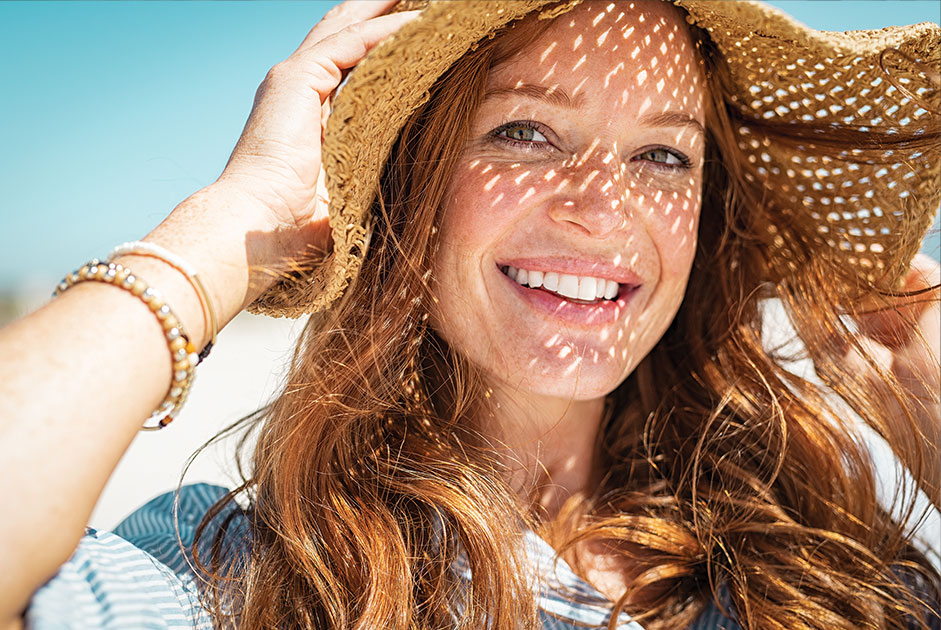UVA V. UVB
UVA rays (or aging rays) can prematurely age your skin, causing wrinkles and age spots, and can pass through window glass.
UVB rays (or burning rays) are the primary cause of sunburn and are blocked by window glass.
Did you know…?
Even on cloudy days, up to 80 percent of the sun’s harmful UV rays can penetrate your skin.
Snow, sand, and water increase the need for sunscreen because they reflect the sun’s rays.
Dermatologists recommend using a sunscreen with an SPF of at least 30, which blocks 97 percent of the sun’s rays. Higher number SPFs block slightly more of the sun’s rays, but no sunscreen can block 100 percent of the sun’s rays.
Common Sunscreen Questions and Answers:
Can I use the same sunscreen each year until it runs out?
The FDA requires that all sunscreens retain their original strength for at least
three years.
Some sunscreens include an expiration date. If the expiration date has passed,
throw out the sunscreen.
If you buy a sunscreen that does not have an expiration date, write the date you
bought the sunscreen on the bottle. That way, you’ll know when to throw it out.
You also can look for visible signs that the sunscreen may no longer be good.
Any obvious changes in the color or consistency of the product mean it’s time to
purchase a new bottle.
Is “Natural” Better?
Scientific evidence supports the benefits of using sunscreen to minimize short-term and
long-term damage to the skin from the sun’s rays. Claims that sunscreen ingredients are
toxic or a hazard to human health have not been proven.
If you are concerned about certain sunscreen ingredients, you can select a formula that
contains different active ingredients as long as your sunscreen is broad-spectrum,
water-resistant and has an SPF 30 or higher
How do I treat sunburns?
It’s important to begin treating a sunburn as soon as possible. In addition to stopping
further UV exposure, dermatologists recommend treating a sunburn with:
- Cool baths to reduce the heat.
- Moisturizer to help ease the discomfort caused by dryness. As soon as you get out of the bathtub, gently pat yourself dry, but leave a little water on your skin. Then apply a moisturizer to trap the water in your skin.
- Hydrocortisone cream that you can buy without a prescription to help ease discomfort.
- Aspirin or ibuprofen. This can help reduce the swelling, redness, and discomfort.
- Drinking extra water. A sunburn draws fluid to the skin surface and away from the rest of the body. Drinking extra water prevents dehydration.
- Do not treat sunburns with “-caine” products (such as benzocaine). If your skin blisters, you have a second-degree sunburn. Dermatologists recommend that you: Allow the blisters to heal untouched. Blisters form to help your skin heal and protect you from infection. If the blisters cover a large area, such as the entire back, or you have chills, a headache, or a fever, seek immediate medical care.
*All information is from The American Academy of Dermatology website. More Information can be found at AAD.org*
Aging is a gift. If you are blessed by receiving it show gratitude each day by accepting, respecting, and protecting your body. The skin is the body’s largest organ and first line of defense–its number one enemy?
The sun. According to the American Academy of Dermatology, an estimated one in five Americans will develop skin cancer in their lifetime, and it doesn’t discriminate. Anyone can get skin cancer regardless of age, gender, or race. Using sunscreen can help prevent skin cancer by protecting you from the sun’s harmful ultraviolet rays. They recommend using a broad-spectrum sunscreen because it protects against both UVA and UVB rays.
Experts from the Academy also recommend choosing sunscreen that is SPF 30 or higher and water-resistant.
Sunscreen is essential every day that you go outside because the sun emits harmful UV rays year-round. It is important to apply enough sunscreen to adequately cover the whole body, including feet, neck, ears, and the top of the head. Skin cancer also affects lips, so use a lip balm or lipstick that contains SPF 30 or higher. Apply sunscreen to dry skin 15 minutes before going outdoors and reapply every 2 hours or after swimming/sweating and according to the directions on the bottle. Reapplying also pertains to products that combine sunscreen with moisturizers and cosmetic products.
Sunscreen helps to protect your skin from sunburn, early skin aging, and skin cancer. However, sunscreen alone cannot fully protect you. In addition to wearing sunscreen, dermatologists recommend taking the following steps to protect your skin and find skin cancer early:
- Seek shade between 10 and 2 and/or if your shadow is shorter than you are
- Wear long-sleeved shirts, pants, a wide-brimmed hat, and sunglasses, when possible.






















